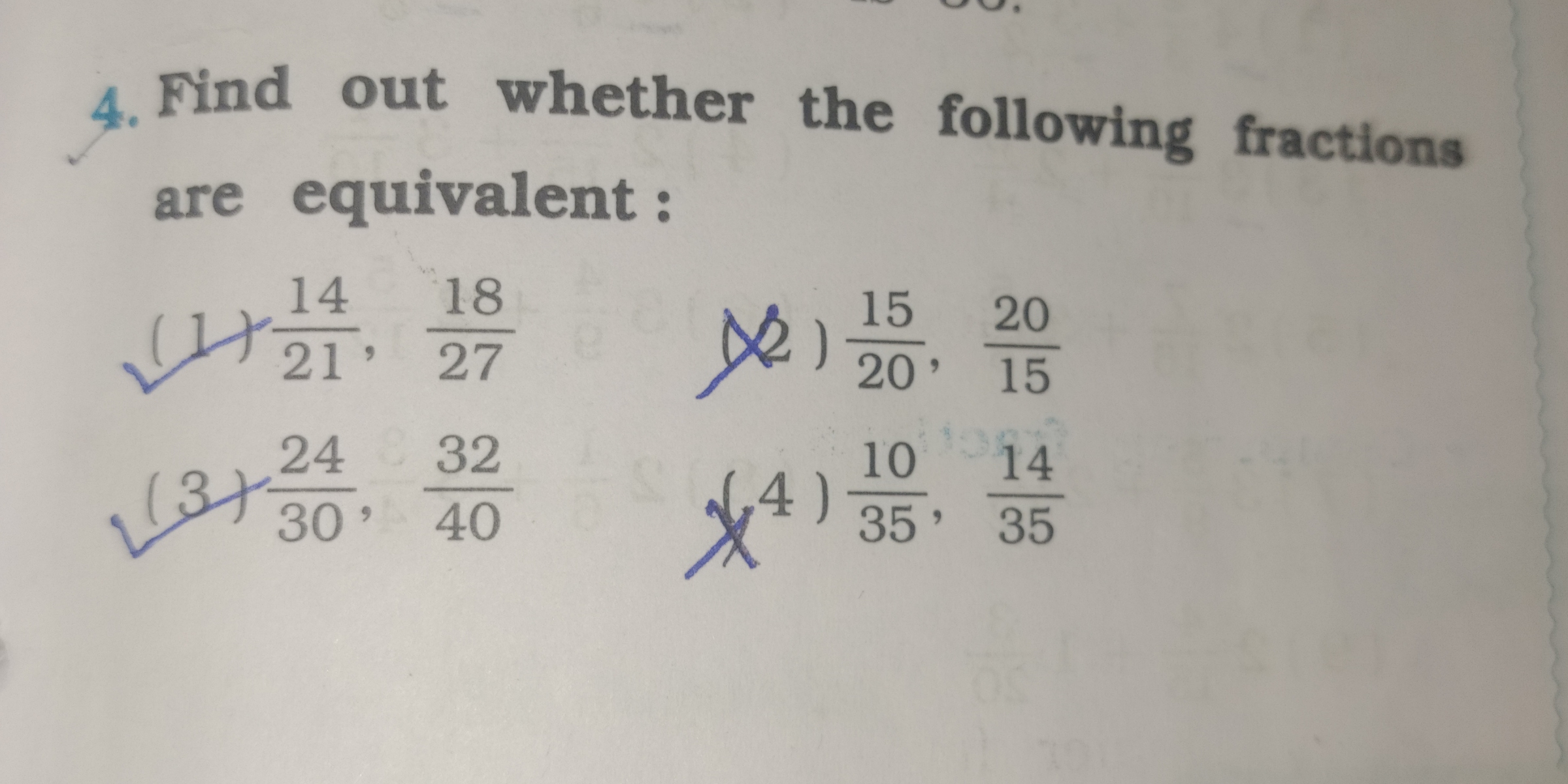Find out whether the following fractions are equivalent: (1) 14/21, 18/27; (2) 15/20, 20/15; (3) 24/30, 32/40; (4) 10/35, 14/35.

Understand the Problem
The question asks to determine if the given fractions are equivalent to each other. This involves comparing pairs of fractions to see if they represent the same value.
Answer
1. Equivalent 2. Not equivalent 3. Equivalent 4. Not equivalent
Answer for screen readers
- Equivalent
- Not equivalent
- Equivalent
- Not equivalent
Steps to Solve
- Simplifying the first pair: $ \frac{14}{21} $ and $ \frac{18}{27} $
To determine if these fractions are equivalent, we simplify each fraction.
For $ \frac{14}{21} $, divide the numerator and denominator by their greatest common divisor (GCD), which is 7:
$$ \frac{14 \div 7}{21 \div 7} = \frac{2}{3} $$
For $ \frac{18}{27} $, the GCD is 9:
$$ \frac{18 \div 9}{27 \div 9} = \frac{2}{3} $$
Both fractions simplify to $ \frac{2}{3} $, thus they are equivalent.
- Simplifying the second pair: $ \frac{15}{20} $ and $ \frac{20}{15} $
Simplify $ \frac{15}{20} $ by dividing by its GCD, which is 5:
$$ \frac{15 \div 5}{20 \div 5} = \frac{3}{4} $$
Now simplify $ \frac{20}{15} $, where the GCD is 5 as well:
$$ \frac{20 \div 5}{15 \div 5} = \frac{4}{3} $$
The fractions simplify to $ \frac{3}{4} $ and $ \frac{4}{3} $, which are not equivalent.
- Simplifying the third pair: $ \frac{24}{30} $ and $ \frac{32}{40} $
Simplify $ \frac{24}{30} $. The GCD is 6:
$$ \frac{24 \div 6}{30 \div 6} = \frac{4}{5} $$
For $ \frac{32}{40} $, the GCD is 8:
$$ \frac{32 \div 8}{40 \div 8} = \frac{4}{5} $$
Both fractions simplify to $ \frac{4}{5} $, thus they are equivalent.
- Simplifying the fourth pair: $ \frac{10}{35} $ and $ \frac{14}{35} $
For $ \frac{10}{35} $, the GCD is 5:
$$ \frac{10 \div 5}{35 \div 5} = \frac{2}{7} $$
Now look at $ \frac{14}{35} $, where the GCD is 7:
$$ \frac{14 \div 7}{35 \div 7} = \frac{2}{5} $$
The fractions simplify to $ \frac{2}{7} $ and $ \frac{2}{5} $, which are not equivalent.
- Equivalent
- Not equivalent
- Equivalent
- Not equivalent
More Information
This comparison of fractions shows how to simplify and verify equivalence. By finding the GCD and reducing the fractions, it's easier to determine if two fractions represent the same value.
Tips
- Not finding the GCD correctly can lead to incorrect simplifications.
- Forgetting to simplify both fractions before comparison may result in wrong conclusions.
- Confusing the order of fractions, especially with the second pair.
AI-generated content may contain errors. Please verify critical information